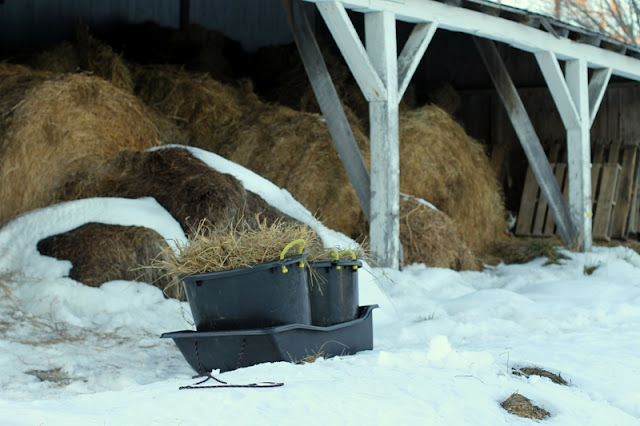 |
| hey hay hay Molly! |
So I did what 99% of the world does today when in need of vital information such as the spelling and pronunciation and definitions of old Germanic and Norse words - I Googled it.
The result was this fascinating and entertaining explanation from The Word Detective.
And no wonder I was confused. Not only are there two different versions of mow - one pronounced like "moe" and one like "cow," there are different ways to describe places to hold hay and other forages.
Here's the quick and dirty run-down as per The Word Detective. Feel free to visit the link above if none of this makes sense:
Mow - rhymes with moe - “to cut down grass or grain with a scythe or machine.”
Mow - rhymes with cow - “a heap or stack of hay, grain, corn, etc.” or “a place, especially a part of a barn, where hay or corn is heaped up and stored.”
So technically, haymow means any haystack. A haystack even still in the field is technically a "haymow."
A stack of round and square bales under the overhang of our machine shed is a "haymow."
{Whew! I've been calling it that for months!}
 |
| Can you see Molly? |
Clearly confused yet?
Which reminds me of my current favorite joke:
"A man walks into a bar completely wrapped in Saran wrap. He asks the bartender, "Bartender, do you think I'm crazy?" The bartender looks at his clothing and replies, "Sir, I can clearly see you're nuts."
But I digress. Back to haymows.
I read on a bit further and discovered a word that's even more confusing - a "mowhay."
In this case, mow still means stack of hay, grain, etc. but "hay" means fence or hedge. A stack of hay enclosed by a fence or hedge.
Substituting "mow" (heap of hay, grain, etc.) with "hay" in mowhay and we end up with a...
hay hay.
Or like I like to greet my friends and family, "Hey, hay hay!"
Now at least I finally know what I'm talking about when I say this.
Cheers -


